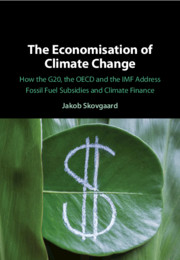The Economisation of Climate Change
The effort to address climate change cuts across a wide range of non-environmental actors and policy areas, including international economic institutions such as the Group of 20 (G20), International Monetary Fund (IMF), and the Organisation for Economic Co-operation and Development (OECD). These institutions tend to address climate change not so much as an environmental issue, but as an economic one, a dynamic referred to as ‘economisation’. Such economisation can have profound consequences for how environmental problems are addressed. This book explores how the G20, IMF and OECD have addressed climate finance and fossil fuel subsidies, what factors have shaped their specific approaches and the consequences of this economisation of climate change. Focusing on the international level, it is a valuable resource for graduate students, researchers and policymakers in the fields of politics, political economy and environmental policy. This title is also available as Open Access on Cambridge Core at 10.1017/9781108688048.
Jakob Skovgaard is an associate professor in political science at Lund University. His research focuses on the interaction between economic and environmental institutions and objectives in climate policy. From 2007 to 2010 he worked in the international climate change team of the Danish Finance Ministry. He is the co-editor of the books The Politics of Fossil Fuel Subsidies and Their Reform (Cambridge University Press, 2018) and Governing the Climate-Energy Nexus: Institutional Complexity and Its Challenges to Effectiveness and Legitimacy (Cambridge University Press, 2020).

